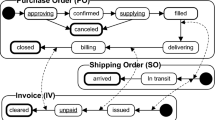Abstract
Inheritance has been suggested as a tool for managing changes in workflow systems. Van der Aalst and Basten [1] have identified four types of inheritance for workflows using a representation based on Petri nets . While they capture intuitions important for business process redesign, they suffer from their inability to state class-level constraints. This paper illustrates this limitation and proposes an extension that accommodates the class semantics and enables explicit representation of constraints on what variations in workflow are consistent with the original workflow. It also shows that the proposed approach subsumes the Van der Aalst and Basten’s four inheritance types under a single framework and overcomes their limitation.
Preview
Unable to display preview. Download preview PDF.
Similar content being viewed by others
References
van der Aalst, W.M.P., Basten, T.: Inheritance of workflows: an approach to tackling problems related to change. Theoretical Computer Science 270, 125–203 (2002)
Lee, J., Wyner, G.M.: Defining specialization for data flow diagrams. Information Systems 28, 651–671 (2003)
Wyner, G.M., Lee, J.: Process specialization: Defining specialization for state diagrams. Computational and Mathematical Organization Theory 8, 133–155 (2002)
Malone, T.W., Crowston, K., Lee, J., Pentland, B., Dellarocas, C., Wyner, G., Quimby, J., Osborn, C.S., Bernstein, A., Herman, G., Klein, M., O’Donnell, E.: Tools for inventing organizations: Toward a handbook of organizational processes. Management Science 45, 425–443 (1999)
Nierstrasz, O.: Regular types for active objects. In: Paepcke, A. (ed.) Conference on Object-Oriented Programming: Systems, Languages, and Applications, Washington, D.C, pp. 1–15. Association for Computing Machinery (1993)
Schrefl, M., Stumptner, M.: Behavior-consistent specialization of object life cycles. ACM Transactions on Software Engineering and Methodology 11, 92–148 (2002)
Kappel, G., Schrefl, M.: Object/behavior diagrams. In: Proceedings of the 7th International Conference on Data Engineering (ICDE 1991), Kobe, Japan. IEEE Computer Society Press, Los Alamitos (1991)
Van Glabbeek, R.J., Weijland, W.P.: Branching time and abstraction in bisimulation semantics. Journal of the ACM 43, 555–600 (1996)
Author information
Authors and Affiliations
Editor information
Editors and Affiliations
Rights and permissions
Copyright information
© 2006 Springer-Verlag Berlin Heidelberg
About this paper
Cite this paper
Wyner, G.M., Lee, J. (2006). Applying Specialization to Petri Nets: Implications for Workflow Design. In: Bussler, C.J., Haller, A. (eds) Business Process Management Workshops. BPM 2005. Lecture Notes in Computer Science, vol 3812. Springer, Berlin, Heidelberg. https://doi.org/10.1007/11678564_40
Download citation
DOI: https://doi.org/10.1007/11678564_40
Publisher Name: Springer, Berlin, Heidelberg
Print ISBN: 978-3-540-32595-6
Online ISBN: 978-3-540-32596-3
eBook Packages: Computer ScienceComputer Science (R0)




